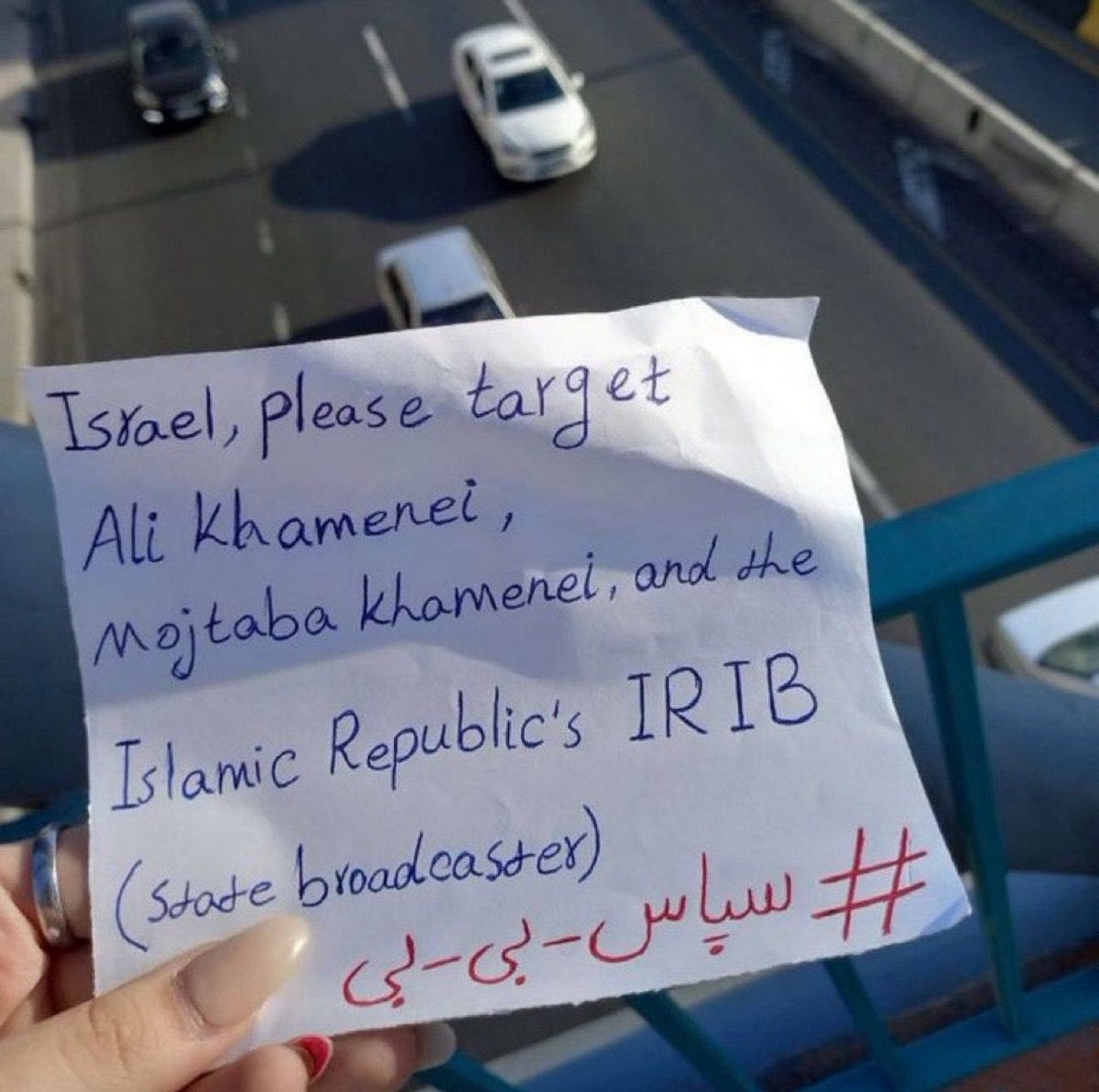In my spare time, I’m an occasional editor-at-large at WhoWhatWhy, a nonprofit news organization founded by the investigative journalist Russ Baker. When I can, I sit in on their Monday editorial meetings and discuss the week’s news agenda with them. I tell them which foreign stories, in my view, are being overlooked or misunderstood by the American media.
After October 7, they asked me to come on their podcast for a debate about Israel’s response with WhoWhatWhy’s international editor, William Dowell, the former Middle East correspondent and bureau chief for Time magazine. If you missed that, you can listen to the discussion or read the transcript here. He and I tend to have opposing views about many things Middle Eastern, so it surprised no one that we had different instincts about the wisdom of Operation Rising Lion.
Russ suggested we have another debate, this time in the form of a letter exchange. He asked me to make the optimist’s case: What might happen in the best-case scenario? Bill will reply with the pessimist’s case: How many ways could this go pear-shaped, and just how bad could it get?
Below, therefore, is the optimist’s case. I can’t say how likely it is to come to pass: The situation is far too unpredictable and chaotic for that. If anyone confidently tells you how this will end, it’s a certain sign that he has no clue what he’s talking about.
But I am not making the case below merely as a rhetorical exercise. The narrow path I see toward not just a good outcome, but an outcome that changes the entire world, and changes it far for the better, is really there.
It is not the only possible outcome. Of course not. But roughly since President Obama took office in 2009, the world has seemed to me to be on a terrible trajectory. Ever-larger parts of the world have come to live under an authoritarian shadow. Liberal democracy has been collapsing worldwide. A brutal axis of revisionist authoritarian powers has coalesced. They have accelerated their attacks. The enemies of liberal democracy have been strangling and swallowing up ever more of the globe. US foreign policy has been an unmitigated string of blunders and disasters.
Threats to organized human life have been mounting: The risk of nuclear war has risen sharply, accompanied by new risks devolving from the new technologies we have not yet learned how to manage safely, such as AI and biotechnology.1 The United States has been increasingly incapable of governing itself at all, still less leading an effective and coordinated global response to these threats.
I have become pessimistic. Our species may not survive the century, I’ve concluded, and if it does, it may be in a profoundly diminished state—in a protracted Dark Age, endured for millennia. Every trend we’ve been witnessing suggests that the Great Filter lies ahead of us. It isn’t far away, either.
My arguments for this kind of pessimism are, unfortunately, sound. Of course, I live my life as if they weren’t. But if you understand the nature and the gravity of the threats we’re facing, the conclusion is hard to avoid.
With Israel’s strike on Iran, however, I see—for the first time since roughly 2007—a narrow path toward a world on a different trajectory. There’s no guarantee that this is the way things will unfold. But it is a reasonable prospect. It’s not so unlikely that to hope for it amounts to hoping for a miracle. So for the first time in a very long time, I’ve felt hopeful about the world. A good feeling.
The narrow path I see toward a good outcome involves the following scenario—which, I stress yet again, is certainly not the only possible scenario. It seems to me possible that:
ܮ
1. Israel could succeed in toppling the regime. Or, rather, Iranians could.
Israel has obviously been working in concert with hundreds of Iranians, including senior regime and military figures. You can’t set up a whole drone base in Tehran without a lot of Iranian help. You can’t pinpoint regime and military figures with such accuracy unless you have people on the inside telling you exactly where to find them.
I can’t imagine many Iranians work for Mossad simply out of greed. The risk is too high. I have to assume they do it because they’re on fire with hatred for the regime. I’ve been wondering, in fact, if what we’re witnessing is less an “Israeli attack on Iran’s nuclear facilities” than “an Iranian coup backed by Israeli air power.”
There have been multiple reports (of varying levels of credibility) of senior regime figures making plans to flee to Moscow. Iran International claimed several days ago that Ali Asghar Hejazi, a top aide to the Supreme Leader, has been engaged in secret negotiations with Moscow. Hejazi is said to be one of the most influential figures in Iran’s establishment. He is at the heart of the intelligence and security apparatus. He oversees critical operations, internally, and controls access to Khamenei.
… According to the information, a senior Russian official has assured Hejazi that in case of escalation, Moscow would facilitate his evacuation via a secure corridor. Other senior Iranian officials have reportedly received similar contacts, with some already finalizing their own exit routes.
From the Times of Israel:
Since 1979, the Islamic Republic has projected itself as a fortress of ideological discipline, religious devotion, and centralized authority. Hejazi represents that fortress: he is the gatekeeper of intelligence flows, the guardian of internal loyalty, and the embodiment of security-driven governance. If someone like him begins looking for the door, the structure may be shaking.
Iran has long been vulnerable—weighed down by sanctions, inflation, internal unrest, and demographic pressure. Yet the upper echelons of power have largely remained intact, united by shared survival. What’s new is the apparent breach in that elite cohesion.
Khamenei is closer to 90 than he is to 80. I have no idea what his mental state is like under the best of circumstances; I know his health isn’t good. The central figures of his regime, his chief military and security advisers, are now dead. There is no uncontested line of succession (very much to the contrary, in fact).
Wouldn’t it be something to see Khamenei flying off to Moscow to join Assad in exile?
🚨 Flash: As I type, Israel is bombing the internal security branches that would crush a nascent Iranian revolution. The people now have less to fear if they take to the streets. This matters—a lot.
These regime institutions are a threat to Iranian people, but not to Israel. This means Israel’s explicit goal now is regime change. Good.
Also reported, not yet confirmed:
Khamenei’s death in an air strike would be just as good as his escape to Moscow. Although it would be good to see him exit the world in the most cowardly way possible: Regime loyalists should be maximally demoralized.
2) There may be a plan for the day after.
Given the number of Iranians involved, I hope—I don’t know—that these Iranians have a plan for taking down the remnants of the regime with a minimum of bloodshed, and quickly putting a caretaker government in place to prevent all-out chaos. If this plan is even ten percent as meticulous as the planning has obviously been for these airstrikes, it could succeed.
If a new regime were able to quickly take power and stabilize the country before it turned into “Syria with loose nuclear material,” it would be a breathtakingly good outcome.
“Syria with loose nuclear material” is also a possible scenario—I don’t at all deny this. But many are now suggesting it’s the only possible scenario, and it isn’t. European leaders are frantically warning that regime change will bring “chaos.” It might. It did in Iraq and Libya. But traumatizing though these recent events were, they were not the only events in history. The chaos in both of those instances had causes: In both Iraq and Libya, it was not the consequence of regime collapse, but of state collapse. That need not be replicated here.
Thank God these people weren’t around when the Berlin Wall fell. Poland would still be in the Soviet Union. (Poland did not descend into chaos, by the way.)
If Israel and its Iranian partners have put any thought at all into what they’re doing—and it appears they’ve put years of thought into it—it wouldn’t be surprising if they came up with a plan for collapsing the regime and quickly taking over the state. It wouldn’t be surprising if they have studied, and learned from, what happened in Iraq and Libya.
And Persians aren’t Arabs.
ܮ
3) The collapse of that vile regime would be the best thing to happen in this century.
First—and above all—for the Iranian people. Obviously.
Scenes from Tehran of Iranians cheering on the IAF have been astonishing to see. Has that ever happened before, anywhere? When you bomb people, as a rule, it infuriates them and makes them rally around the flag.
But the regime hasn’t been able to mobilize so much as a dozen limp protesters to go out and shout “Death to Israel” for the cameras. Or if it has, I haven’t been able to find the video of it, and I’ve been looking. The people are shouting “Death to Khamenei.”
I know there’s a limit to what we can conclude from social media posts, but Israel seems to have hit all of the regime’s propagandists, because no one is making even a desultory effort to defend it. (No Iranian, that is. The Western far-left is, predictably, firmly on its side.)
Instead, Iranians on Twitter are sending the IDF coordinates of the sites they should bomb next. These accounts aren’t fake. They’re not bots. Nor do they belong only to exiles. Many are people I’ve been following for years.
Maybe the regime can still rustle up some support in rural areas, but if they haven’t mobilized anyone in the cities yet, it’s reasonable to assume that they can’t.
This confirms the polling we’ve seen about the degree to which Iranians hate that regime. The estimate I usually see is that fewer than 20 percent of the population supports it. This figure appears to be perfectly correct, not wishful thinking or a polling error. Given this, the outcome of the regime’s demise may be much less chaotic than the world fears.
Can you imagine what a free Iran would mean for Iranians? I’m sure that any stable regime, of any kind, would be better than this one. So long as the IRGC isn’t running it, it could only be an improvement.
Even an unstable government would be better. The worst-case short-term scenario for Iran is “Syria,” but even that might be better than living with this regime forever. Many Iranians I know think so.
ܮ
5) But it wouldn’t just be astonishingly good news for Iran.
The fall of the regime would give the Middle East, for the first time since the collapse of the Ottoman Empire, a real shot at a prolonged period of peace and stability. It would also herald the beginning of the end of political Islam.
Obviously, a genuinely existential threat to Israel (and Europe, and even the US) would be gone. But imagine the Middle East without Iran’s proxies, without Iran’s terrorism, without its meddling.
In 1979, political Islam burst out of Iran like a tiger. It has seemed unstoppable. But if that regime collapses in ignominy, with nothing to show for its pains but mountains of corpses, it will discredit and demoralize every militant Islamist in the world, and their cells and terrorist groups and governments, too. The worst of them would face an immediate cash crunch. The massive Islamist wave that’s been threatening us since 1979 would, for the first time, begin receding.
ܮ
6) Just as authoritarianism tends to be contagious, so is liberalization.
If the regime falls, and if something better—even slightly better—takes its place, it will galvanize democracy movements around the world. It will inspire everyone who’s fighting to bring down a corrupt and tyrannical regime.
It will be—it is, already—massively beneficial for Ukraine. Iran’s drones have been pounding Ukraine night after night. To have Iran’s defense industry destroyed would be a huge and unexpected boon for Kyiv.
ܮ
7) They could even take Putin down with them.
Ukrainians are hopeful that this is so:
What a miracle that would be—unless Russia collapses into warring nuclear-armed fiefdoms.
That is something to worry about, and we should be planning for that scenario. (I reckon we’re doing no such thing, because we’ve replaced our security establishment with fools and drunks.) But again, “chaos” is not the only possible outcome. Again, it depends how quickly a caretaker government can be found to stabilize the situation.
If Khamenei and Putin both go down, we’re in a new world—one so much better than the one we’re in now as to be unrecognizable.
Trump and Trumpism can’t survive Putin’s collapse, by the way. If we see a global liberal revolution, Trump will be one of its first casualties. (I hope no one mentions this to him.)
Admittedly, we’re now in the realm of hyper-optimism. But if both of those regimes were to fall, we might survive this century. Suddenly, almost everything is possible.
ܮ
8) It’s a better world already
Even if I massively temper my optimism, just setting back Iran’s nuclear program by a matter of years makes the world vastly better, and at this point, it looks as if Israel’s already achieved this. (It’s hard to say without knowing what they’ve got hidden in Fordow and elsewhere.)
An Iran with a nuclear weapon or several, or an Iran permanently at the threshold, would be unbelievably destabilizing and dangerous.
I don’t say this because I’m certain they’d use it, though I think the chances of Iran using a nuclear weapon are much higher than those of the US, Russia, or China doing so. I say this because an Iranian Bomb, or a threshold-Bomb, will trigger a nuclear proliferation cascade and multiple regional nuclear arms races. About this, I’m not uncertain: The odds of it are 100 percent.
The Saudis, the Turks, even the Egyptians would nuke up. Israel would nuke up ten times over. The NPT is already on the verge of collapse owing to the United States’ erraticism. If Iran tested a nuclear weapon, all of this would happen within weeks.
Then, given what we know about the risk of accidents alone in complex, tightly coupled systems—and the experience we’ve already had of close calls—we would all, frankly, be dead men walking. Even when the balance of terror was restricted to a far more stable two-state dyad, we came so close, so many times.
The region in question is home to some of the most unstable and mutually hostile states in the world, along with the most bloodthirsty and lunatic terrorist groups. If Iran has the Bomb, it is simply a matter of time—months or years, not decades—until the whole planet is bristling with poorly-controlled nuclear weapons wielded by inexperienced states, most of them lacking a strong security culture. Then we’re an accident away from human extinction. Ask how long the world has been able to go without a major plane crash and you’ll have a sense of how long it might take.
ܮ
9) Yes, they might now race for the Bomb.
But with every nuclear site and regime figure who vanishes in a puff of smoke, the odds of that drop. There’s a limit to what you can accomplish if you’ve been vaporized.
Overall, this is real cause for optimism.
There’s also cause for pessimism. At this stage, no intellectually serious person would try to assign odds to the optimistic and pessimistic scenarios. It just isn’t possible.
But it’s sure worth pointing out how good it would be if the scenario I sketched out about were to come to pass—because it’s worth saying that we should do everything in our power to ensure it does.
Of course we should strike Fordow. There shouldn’t even be a debate, but alas, there is. Of course we should be feverishly making plans to support a new Iranian government.
The Senate should be putting overwhelming pressure on Trump to fire Pete Hegseth, Tulsi Gabbard, and the witless Witkoff. Trump desperately needs a serious, experienced team of foreign and military policy professionals around him to handle this. This is no time for that crew of imbeciles, traitors, and fourth-string New York real estate guys. Get the pros in—and keep JD Vance and Tucker Carlson separated from Trump with a crowbar. (Marco Rubio might be able to help if he’s not too busy running the Postal Inspection Service and the Navajo Housing Authority while serving as the White House Gardener, National Volcano Surveyor, and sculptor to the US Mint.)
ܮ
10. My God, the antisemites are idiots.
The wave of antisemitic sentiment that’s swept the West since October 7 has caused far too many people to lose their minds. I’m very worried that Tucker Carlson and the Jew-hating part of the MAGA base will convince Trump that Iran’s nuclear weapons program is “none of our business” and we should “stay out of this.” To judge from social media, there’s been a huge wave of MAGA anti-interventionist sentiment based on nothing more than the belief that if Israel wants Iran’s nuclear program gone, we should be in favor of Iran keeping it.
This is insanity. Iran—with nuclear weapons? Iran—with the ability to incinerate all of us, along with our families? Only minds wrecked by hysterical Jew-hatred could think this makes sense. As an ideology, antisemitism has an unusual capacity to madden those afflicted by it. It causes them to lose all connection with linear thought. This is precisely why antisemitic regimes shouldn’t have nuclear weapons.
But I am seeing many people indicate, in all seriousness, that a regime with a deep ideological and theological commitment to the view that we must die ought to have the Bomb, because otherwise, AIPAC wins. Perhaps they don’t get it. “Death to America” isn’t just a figure of speech. The regime has been organized around this principle since its birth. The clerical regime literally believes that we are Satan.
Those who hate Israel so much that they literally cannot believe that Israel might be doing something good—something for which they should feel grateful—are not motivated by “anti-Zionism.” Or if they are, anti-Zionism and anti-Semitism are synonyms. A hatred of Israel such that you can’t even say, “Thanks” when Israel rids your enemy of his nuclear weapons program so clearly devolves from ancient myths and historic beliefs about the infinite evil of Jews that it doesn’t even bear discussing.
Sentiments like these give rise to strategic idiocy—especially among the MAGA base, whose views matter a great deal to Trump. If he mishandles this opportunity because of this, it may ultimately get us all killed.
ܮ
I have corrected typos and revised a few words (for clarity) since mailing this.
We’ve written at length about these risks. See, for example:



































Isn’t Iran also in a much stronger position wrt human capital than Iraq or Libya when it comes to forming a stable non-theocratic government if the regime is toppled? Did either of those countries actually have such a large pro-democracy movement or a younger generation educated and open to the modern world?
Thank you for the thoughtful contrarian take.
Trump’s actions seem to be based on the principle that Iran cannot be allowed to develop a nuclear weapon. Full stop.
He isn’t going to be distracted by Bannon and Carlson not just because Miriam Adelson gave him $100 million and not just because he has sort of Jewish grandchildren, but because he thinks that this is winnable and that a victory would set him up for a third term at least.